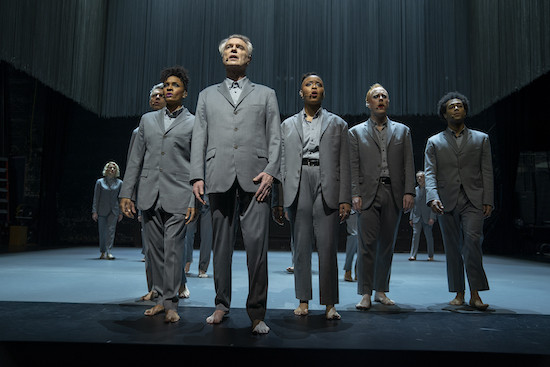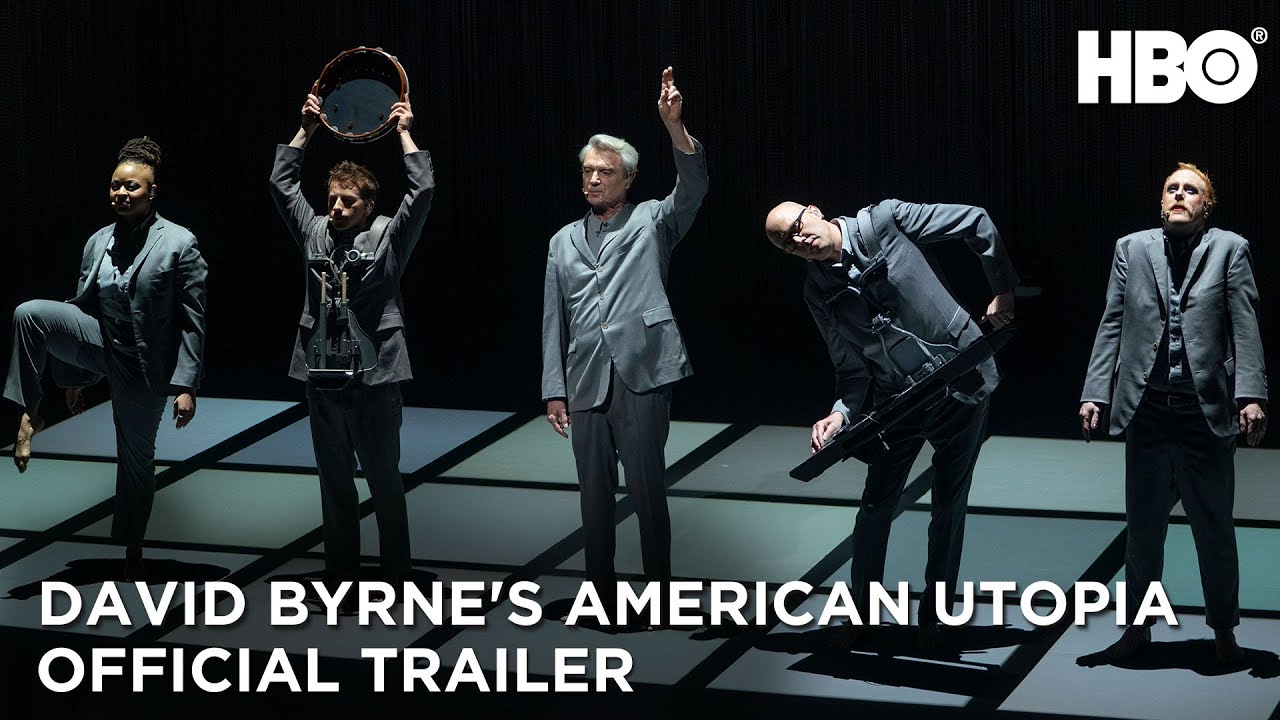Irrespective of the year and its circumstances, unprecedented or otherwise, there is magic in the seams of every David Byrne performance. It’s a pure, intelligent and often electrifying thing – and never more so than when trusted in the hands of the great Spike Lee.
This version of American Utopia, Byrne’s sell-out show performing numbers from his solo album of the same name but also building a whole world made up of musings and memories from his Talking Heads day as well, elevates the material to new heights while reminding us just how thankful we can be that it exists.
We could talk about how tedious and neverending this year has been, how frustrated and devastated we have been to be at home so much, or we could cling onto the things that help us get through it all. This is what this version of American Utopia does. And so to get one step closer to remembering what the real thing was, is, and always will be like, my esteemed colleague, music writer Chris Taylor and I, have transcribed what would have been the post-gig debrief.
You know the one: all the things you would have said if you could hear each other over the noise during the show, the giddy snatches of thought you have to vocalise before they disappear into dust forever, the "did that really happen?" moments you have to check with each other, ears still ringing, legs still wobbling, sweaty palms now grateful for the ice-cold air and the feeling of just having lived something brand new, together.
It’s not the real thing and we won’t get it for a while – but it’s the best we can do for now. Turn up Lee and Byrne’s brand new masterpiece, and enjoy the show. – Ella Kemp, Film Editor
Chris: It’s been a while since we’ve had gigs. Proper, sweaty, close-contact gigs where dancing isn’t an exercise in avoidance. And, to me, there’s no greater moment than that post-gig debrief at the pub or on the trip home. So, in an effort to try to recapture that gig magic in some way, I’ve got to ask that age-old question: What did you think then?
It’s tough not to compare American Utopia to Stop Making Sense (which we’ll probably do later) but it shares all that same euphoria I remember experiencing the first time David Byrne walked out on stage with his tape recorder. Watching his band members, free of wires and marks, roam the stage and, more often than not, lose themselves in the music too, is just as thrilling. I think it’s testament to Byrne’s have-a-go attitude that he’s managed to pull off not one, but two concert movies that redefine what a concert movie can be. Three if you count Contemporary Color.
Ella: Well, I plainly, completely, entirely loved it. And I really feel like it had a similar effect to a gig, where I went in not expecting tons – or expecting some things I knew I’d enjoy on paper, but I didn’t expect to feel totally re-energised after in a very physical way. I was just totally grinning and couldn’t sit still, despite having no influence from, as you say, proper, sweaty, close-contact spaces. It was just me in my bedroom but still had such a visceral impact, which is something I’d also felt with Stop Making Sense.
What were your expectations going into this? All I knew of American Utopia was that it was Byrne returning, and that it was a Broadway show I would absolutely never see and would always be upset about – but the staging and the setlist were all brand new to me, which felt really exciting.
Chris: I was lucky enough to see this show, or a version of it, twice before it hit Broadway. To me, these felt like once in a lifetime events (no pun intended). So American Utopia was mostly a chance to relive that.
I knew the beats, most of the setlist and the surprises and gimmicks that were coming. Even his voter registration spiel was almost identical to what I remembered. What was most interesting to me was both how this show would feel in the current state of the world and how this very rigorously put together stage show would translate to film.
When American Utopia had its touring run in 2018, it felt like a whole other world. Part of that glorious World Cup summer. Now, of course, we’ve spent much of the year without human contact, the sheer disregard of political leaders towards the people they’re elected to govern is more acute than ever, and there’s just an overbearing feeling of hopelessness. It sounds naive to say, but watching American Utopia felt like a chance to forget that. To escape to a world where people care about other people.
Byrne is notoriously a bit of an egocentric control freak but, in his later life he’s made a marked effort to encourage connection. American Utopia is more than just a form of escapism. By putting you among the band, the dancers and Byrne himself, sometimes with almost uncomfortable Jonathan Demme-esque close-ups, it’s a chance to feel that connection only a gig can give you.
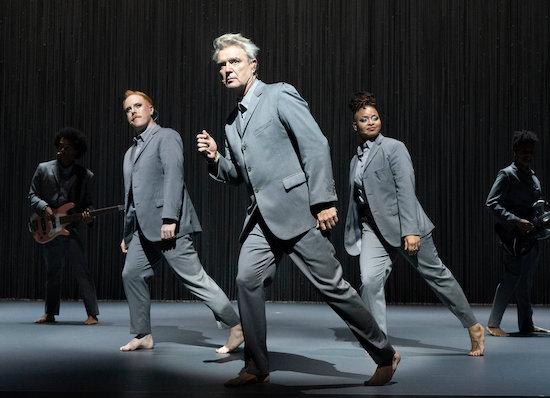
I mention Demme because this film is heavily indebted to him, in a way. There’s a tribute to him in the credits and, of course, Stop Making Sense set something of a template for how concert films could be more than just filmed gigs. And yet these are two very different films. Not just because this is Byrne but much older, but also because Stop Making Sense was driven by spontaneity and naivety, a bunch of former art students having a laugh, whereas American Utopia is much more considered. In movement, in on-stage banter, even in callbacks to Stop Making Sense. How do you think Spike Lee handled all this? Did you think he was the right fit?
Ella: I love what you mention about escapism – I don’t think any kind of positive mental action is naive in 2020. But as you say, it’s calculated, it’s controlled, this isn’t just a spontaneous hopeful celebration of humanity – they know exactly what they’re doing.
“They” being Byrne, of course, but also Spike Lee. When I saw this was set to be a Spike Lee joint I was excited because of the nature of every Spike Lee joint, but I couldn’t quite figure out whether he’d be compatible with Byrne’s more offbeat and wholesome persona. With hindsight, I’d say yes, absolutely, it’s such a revelation. American Utopia feels like Lee injects a shot of lightning into Byrne’s theatricality, moving with such sharp conviction, focusing on the contrasting shadows and stark lines of the stage in a way that feels sober and clinical, in a sophisticated sense.
I love the way he uses the height of the stage – there’s a handful of frames shot from above that have a holy quality to them, that really make you feel the power of Byrne’s words, of his warning and plea for understanding and community. Urgency has always been Spike Lee’s mother tongue.
Also, when it came to the Janelle Monae cover of ‘Hell You Talmbout’ – which, not having seen the show before, knocked the lights out of me – the way Lee juxtaposed images of the families of Black people who had been killed with the live footage from the show hit me right in the gut. It was violent, but not abrasive in any way that was unnecessary.
The whole thing was slick, fast, fun, important. I think it’s a real testament to Lee’s energy as a filmmaker as well because, well, Byrne is getting older! He’s not the young man in the big suit of Stop Making Sense anymore. What did you make of his performance here, being so familiar with his quirks and bounce from 1984?
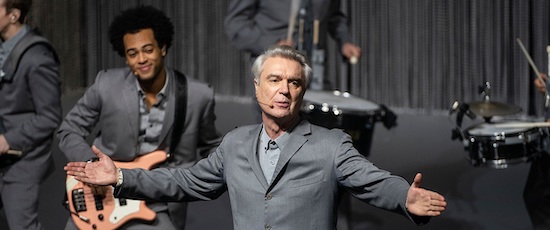
Chris: It’s interesting that you were so taken by Lee’s direction throughout because I often thought he was quite anonymous. I’m not sure if it’s because of the rehearsed and perfected nature of the performance, with most of the playfulness already there, but, for the most part, I wouldn’t know who was behind the camera if his name wasn’t all over the poster. We know Lee can direct incredible music scenes – Mo’ Better Blues is packed with visceral performances both on the stage and off it. But, until the particular moments you pointed out, I found some of his camera movements sometimes at odds with the message of the show.
American Utopia proudly uses the whole stage. It’s why the band is wireless, after all. So there’s a lot going on at any one time. Karl Mansfield might be jamming out on keyboards in one corner looking like all of Kraftwerk at once. Angie Swan might be shredding on the guitar somewhere else. And yet it often feels like Lee’s camera is so intent on focusing on Byrne, even in those collective moments. It might just be that I’ve seen the full expanse of the stage in person, and it might be nit-picking, but compared to the wide angles of Stop Making Sense, even when it puts you on stage, American Utopia can sometimes feel a little claustrophobic.
Those moments, of Kaepernick and ‘Hell You Talmbout’, do really mark this as a Lee film though. ‘Hell You Talmbout’ in particular is a blistering song because of its simplicity. But with Lee’s montages (a signature he’s really used to great effect in recent years), it becomes all the more visceral. That these scenes can barely keep up with the names being sung. That the song has even more names than it did when it first came out in 2015. That Lee then highlights the many more that aren’t even mentioned, including deaths that occurred after it was filmed. That’s where Lee really puts his stamp on it. It’s not about redefining the concert film as it was for Demme, it’s about seeing how he can enhance Byrne’s message.
I think Byrne definitely knows he’s getting older. He’s a sage now, not a preacher. It’s probably why he’s surrounded himself with dancers and musicians, so he can slip into the background but still create a great show. There’s definitely none of the (allegedly coke-fueled) racing around the stage here! His art school sense of humour and tilt towards Dadaism is still there, though, which really elevates some of the weirder tunes from his most recent solo stuff. How he manages to pull off the lyrics to ‘Every Day Is A Miracle’, I’ll never know.
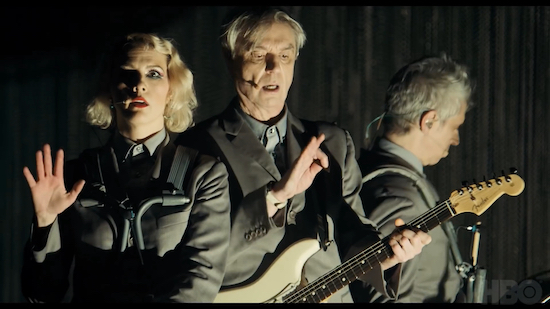
Speaking of which, we should probably get into the setlist. How did you find it, especially given this was initially to support his latest solo album, but became more of a David Byrne Greatest Hits tour?
Ella: I can’t beat around the bush here: I adored it. I really do like the album on the whole – there are just a few tracks I could give or take, which is why I’m glad that’s what Byrne does. Again because I went in blind, I didn’t know there actually would be other songs in the setlist, so let me tell you that felt like a proper jolt of lightning. I thought the balance between what was promised and what was expected was deftly handled, with no Talking Heads fan really being able to complain while still being told how far we’ve come since 1984.
‘I Know Sometimes A Man Is Wrong’ quietly blew me away – both in terms of the song I hadn’t really thought much about, and the way Lee staged it, from the side, everything around Byrne in the dark, focused on this old man starkly admitting his flaws and the weaknesses he needs to admit in order for us all to heal. That feeling was mirrored in ‘One Fine Day’ at the end, the same melancholy and wisdom now rippling across the whole band and making this gorgeous, almost divine performance of community, and, well, hope. That felt like gold dust.
And then the TH classics were, obviously, a riot. I love that they’re played without any kind of taunting or teasing, there’s no excessive build-up. They launch into ‘Burning Down The House’ recklessly because that’s exactly what you would be doing – what would be the point in just watching the smoke slowly grow and grow? The way they stage ‘This Must Be The Place’, too, feels like such a satisfying nod to SMS in the way Byrne still remains in light, all those years later.
But I think my highlight is ‘Road to Nowhere’. I guess because ‘One Fine Day’ was so stunning it felt like such a powerful full stop, I wasn’t expecting anything else. I don’t know if it’s because I was at home or because I considered it more of a play than a gig at times, but I just wasn’t expecting an encore. But then also on a personal level, ‘Road to Nowhere’ is definitely in the top five Talking Heads for me. And in terms of a lasting note, the lesson given to each audience member to take home feels perfect. Have you listened closely? Have you figured out where we’ve gone wrong? Do you know how you’ll be better? That’s good, but still buckle up for a world none of us understand. Who knows where we’re going.
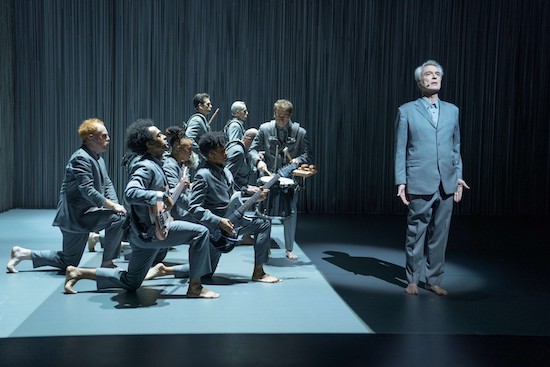
What did you make of it? And considering this is, after all, a film, were there any visual tricks or scenes that really stayed with you? I think about the way Spike Lee films shadows every day.
Chris: I think it was such a great display of his career as a whole. I’m less keen on American Utopia as an album compared to some of his more unique records like My Life In The Bush Of Ghosts, Rei Momo, and the Windows Media Player classic Look Into The Eyeball. But bringing it to stage really helps to add something special to the tunes. The way they staged the glitchy dance break of ‘I Dance Like This’ was such a fun visualisation of it all.
The biggest surprise was ‘I Should Watch TV’ from his highly underrated collab album with St Vincent. But I can’t imagine what it would have been like to see this without knowing there would be Talking Heads tunes involved.
There was nothing quite as clever as SMSi’s building of the set from an empty floor to a packed out stage. As you said, there’s no teasing here. It’s straight in with the action. There’s a real respect for time, which is an odd thing to say about a concert when you want it to go on forever (though maybe not to Neil Young or Cure levels). He knows why the audience is there, what they want to hear and what they want to see. The knowing nods are never overtly highlighted, because alienating those that haven’t seen SMS (though unlikely, because they’re there to see Byrne after all) is far from the message of the show.
You’ve mentioned the scenes I liked most, from the fire red of ‘Burning Down The House’ to the dancing with lights. But I think mention needs to be made of the stage as a whole. The chain curtains create such amazing fluidity, with band members disappearing and appearing without much spectacle. It never takes your eyes away from the action, and it means you never have a band member on stage doing nothing. It feels like an amazing playbox. A very sparse one, but what Byrne and the band fill it with more than makes up for that.
The concert film feels like it’s making something of a comeback. But most, like Amazing Grace or Rolling Thunder Revue, have been based on old concerts. Only the spectacular Homecoming really lets loose with something from the last couple of years. The pandemic has put a pause on live performances and things have moved into the livestreamed sphere, with artists getting more creative with how they perform (Nick Cave’s Idiot Prayer for instance). Do you think we’ll be seeing more concert films just out of sheer necessity? Especially given American Utopia is something of a balm right now. What would you like to see from artists doing this?
Ella: I’m so glad you mentioned those curtains, I think that they, working alongside the immaculate grey suits worn by everyone, make for such a sharp and clean aesthetic that I wouldn’t usually associate with live performance necessarily. Everyone’s hair stays in place, makeup is flawless, without ever sacrificing an ounce of energy. I don’t know how they do it. Also I’ve said this before, but isn’t it astonishing how American Utopia has somehow made grey seem like a hopeful colour?
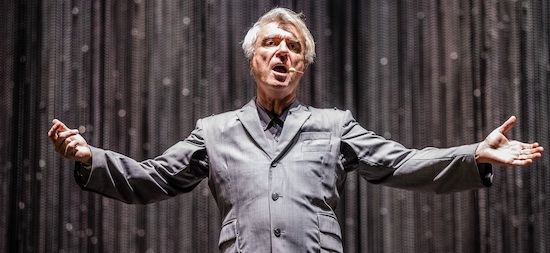
Anyway, the necessity of the concert movie. In short, yes, I think there are more to come. Partly because, ten months into the pandemic, I don’t think I’m breaking any news to you by saying the world is still in a sorry state. There’s progress, for sure, but the things I miss the most – claustrophobic events in big venues – will be on hold for a while. Not everything I’ve watched this year has been as good as American Utopia, because I think that regardless of the circumstances it’s testament to mind-boggling talent that, well, not everyone has, whatever the year.
I’d love to see more concert movies directed by filmmakers I know. I’m sure that’s a wildly optimistic and maybe obtuse thing of me to say, but by that I mean that I want to see more concert movies that feel like movies, rather than being asked to feel excited and grateful purely because someone pressed one button on one camera. It’s so, so hard for a concert film to replace the real thing – and I frankly think that if that’s what you’re asking for, you’ll always be disappointed. And so that’s why it’s so important to adapt, to enhance. You can do different things with a cinematic format, whether that’s at home or on the big screen (on that note, I would love to see AU in cinemas one day).
You can’t replicate the heat emanating from too many bodies in too small a space, but you can be forced to look at things you might not consider. That one in 12 musicians shining brighter than the rest. The shadow on the wall that makes you realise how much bigger this is than just one show. The names of Black people who were murdered at the hands of the police.
I want to see artists thinking about where their material is going. Who is receiving it, and where. American Utopia is so special because while watching it I felt like my bedroom was so much bigger, my eyes wider. It felt like it knew, somehow, where I was and what I needed – rather than assuming that just seeing any music on any screen would work. There’s potential here to make magic, for sure. All I hope is that we can really use this time to seize it.

